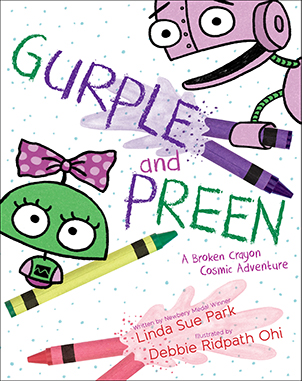Interview: Peggy Eddleman and SKY JUMPERS (Random House Children's)

SKY JUMPERS - Author: Peggy Eddleman - Hardcover / 288 pages / Publication date: Sept. 24, 2013 from Random House Children's Books. ISBN 0307981274. More info about the book on Goodreads.
SKY JUMPERS by Peggy Eddleman is a fast-paced middle grade adventure with engaging characters and imaginative world-building. I was totally fascinated by the idea of the Bomb's Breath, a layer of chemically altered air that will kill those who breathe it yet slows the fall of Hope and her friends when they jump into it. I can't wait for the next book in the series! Highly recommended.

Book description:
What happens when you can’t do the one thing that matters most? Twelve-year-old Hope Toriella lives in White Rock, a town of inventors struggling to recover from the green bombs of World War III. But Hope is terrible at inventing and would much rather sneak off to cliff dive into the Bomb’s Breath—the deadly band of compressed air that covers the crater left by the bombs—than fail at yet another invention. When bandits discover that White Rock has priceless antibiotics, they invade. With a two-day deadline to finish making this year’s batch and no ingredients to make more, the town is left to choose whether to hand over the medicine and die from the disease that’s run rampant since the bombs, or die fighting the bandits now. Help lies in a neighboring town, but the bandits count everyone fourteen and older each hour. Hope and her friends—Aaron and Brock—might be the only ones who can escape to make the dangerous trek through the Bomb’s Breath and over the snow-covered mountain. Inventing won’t help her make it through alive, but with Aaron and Brock’s help, the daring and recklessness that usually gets her into trouble might just save them all.
About The Author:
Peggy lives at the foot of the Rocky Mountains in Utah with her husband and their three children. She enjoys painting, playing games with her family (especially laser tag), and of course, reading.
Where to find Peggy online: Website - Blog - Twitter - Facebook

Q. What's your writing process?
I know it’s strange, and unlike 97% of authors, but I don’t write in my pajamas. I don’t write on the couch, and I don’t write in bed. Ever. I do line edits on my desktop computer, because it’s easiest there. But my desktop is also where I tackle all the non-writing aspects of being an author, so being in front of that computer distracts me. Plus, I feel like I’m in a cave. And I face a blank wall. It’s all very uninspiring.
 Peggy writing in the Museum Of Art gardens.
Peggy writing in the Museum Of Art gardens.
So when I write or revise, I take my laptop somewhere else. A lot of times it’s my kitchen table, with the blinds on my french doors wide open, spilling in sunshine and a view of the trees, with my hubby and kids nearby. Sometimes it’s on my porch swing on my back patio with the bugs and the cat. And sometimes I go anywhere else. I take a camp chair to the ridiculously beautiful mountains overlooking my valley, I go to the park, the beach, next to a stream in the canyon, or at a neighborhood fast food dive that has the best shakes and who don’t care if I stay forever. The more ambiance and sunshine, the better.
 Peggy writing on the beach.
Peggy writing on the beach.
When I first became a writer, I got my best ideas while folding clothes (which was mightily convenient). Sadly, though, that seemed to wear off. Now I work though the trickiest of plot problems while walking. There’s a great pedestrian canal road that runs alongside my town where I can talk out loud to myself all I want (because that when the best ideas always come, right?), and people are rarely close by enough to care. It gets hot where I live, though. Like melting hot.
 Peggy writing in the mountains.
Peggy writing in the mountains.
Because of my publishing schedule, my summers are always spent deep in revisions, and it’s just way too hot for my canal walks. So I wear paths around my shaded backyard, circling it and circling it and circling it until I come up with my answers. It also gets cold where I live. Like freeze-your-lungs cold. Winter is when I draft, though, and that’s when I’m left to rely on a good ole basket of laundry for ideas.
Q. How did SKY JUMPERS get published?
I decided that I wanted to take the traditional publishing route, and I started by reading everything I could about that process. I poured over writing blogs. I went to conferences and classes and joined critique groups. I made writing friends online. I read post after post about writing query letters. I learned what querying can do to your mental state and prepared myself for it. I learned hot the publishing industry worked. I was determined to go into this with my eyes wide open, and to have myself as prepared as possible for every aspect of it.
 Sending her first pass pages for Sky Jumpers back to NYC.
Sending her first pass pages for Sky Jumpers back to NYC.
After I had a manuscript (my fifth) that was unique, critiqued by dozens, well-revised, and one I knew had a good chance of selling, I set to writing my query letter. Learning so much about getting an agent may have brought out the defeated perfectionist in me. I’m not going to lie– it was very difficult to write my query letter! And it was very difficult to rewrite. And rewrite. And rewrite.
 Signing her contract.I slaved over every word, every sentence, making sure they were the exact right one. And then I’d put it away and bring it out after a week or two, so I could slave over it with a fresh mind. Whenever someone offered a query critique, I took them up on it. I took a query-writing webinar and had an agent critique it. I took conference classes on query writing and had the presenter critique it. I had my sister critique it so many times, I was sure I’d invented a new form of torture.
Signing her contract.I slaved over every word, every sentence, making sure they were the exact right one. And then I’d put it away and bring it out after a week or two, so I could slave over it with a fresh mind. Whenever someone offered a query critique, I took them up on it. I took a query-writing webinar and had an agent critique it. I took conference classes on query writing and had the presenter critique it. I had my sister critique it so many times, I was sure I’d invented a new form of torture.
I’m not exaggerating when I say that I spent five months on it. Was that overkill? Quite possibly. Would I do it again? Absolutely. I’ve gotten some serious mileage with that baby! It got me both an agent and an editor quickly, a lot of the phrases / sentences from it are word for word in my jacket flap, and my agent uses it as an example when she talks about query writing at conferences. Best of all? Those phrases are burnt so deeply in my brain that when someone asks me to tell them about my book, it’s not so hard to tell them.
A question I get asked often goes something like this: “After your editor makes you change a bunch of things, did it feel like it wasn’t your book anymore?”
The answer is absolutely not.
When I got my first edit letter, my editor told me that I didn't have to change a single thing in my book if I didn't want to– that they loved it already and it was good enough to go to print as is. It could've been tempting to just say, “I'm going to leave it as is, then, because it's just how I want it. Then it’ll still feel like my book.” (For the record, it wasn't actually tempting.) Instead, I dove into the 9 page single-spaced edit letter full of really tough suggestions with an open mind and a willingness to work. And then we went through another three tough rounds and a round of tweaks after that before going to copy edits.
 Standing outside the Random House building on a trip to NYC to meet her editor.
Standing outside the Random House building on a trip to NYC to meet her editor.
And do you know what I learned? That there really isn’t anything to worry about when it comes to the book no longer feeling like yours. Editors rarely tell you what you have to do to fix something. They just bring up the issues or places that it can be improved, and let YOU figure out how YOU want it solved. They’ll brainstorm with you on how to fix each thing if that’s what works for you, or they’ll let you figure it out on your own if that’s what works. The point is, in the end it’s still full to the top of your ideas and your writing. It’s just better. Because under the direction and support of someone who is brilliant, your own brilliance can find a way out.
 In the NYC subway, holding her very first ARC of Sky Jumpers.
In the NYC subway, holding her very first ARC of Sky Jumpers.
Q. What advice do you have for aspiring children's book writers?
Three things: be persistent, be teachable, and be flexible.
Be persistent.
This profession is not for quitters. It gets tough and you’ll get knocked down and beat up and rejected a lot of times and in a lot of ways. And the only way you’re going to get through it is if you have a very strong conviction that what you are pursuing is exactly right for you, and that you are strong enough to do it. So when those really tough things happen, you can remind yourself that you were made for this, and you can take anything that’s thrown at you. That you can stand back up, lick your wounds, and most importantly, that YOU CAN DO THIS. That you aren’t going to let a little thing like a harsh critique or a few bad writing days in a row or a rejection letter or even hundreds of rejection letters or shelving a beloved manuscript and starting over again stop you. That when it comes right down to it, you are going to win because you never quit.
 At the filming of her book trailer.
At the filming of her book trailer.
Be teachable.
When you first start writing, it is so easy to feel like you’re an expert. (If you’re in this blissful stage right now, enjoy it. Enjoy it A LOT.) But the truth is, the more you learn, the more you realize you don’t know. You can stay in that stage where you feel like you’re the expert for as long as you want, but you will never improve until you kick yourself out of it. And the only way to do that is by being teachable. When you have someone critique your work, and their critique hurts right down to the center of your soul, resist the urge to get defensive and to decide that they’re wrong. That they just didn’t get what you were going for, or think that they just aren’t as good of a writer as you, and therefore can be ignored. Let those feelings die down and then look at it with fresh eyes. There is truth in every critique if you are willing to be teachable. The thing about writing is that you will never get to the point where you can’t improve anymore, or where you don’t need to improve anymore. Yes. It’s both frustrating and awesome. The really great authors are the ones who never stop learning.
 The kids playing Aaren, Hope, and Brock in the book trailer during their sky jumping scene.Be flexible.
The kids playing Aaren, Hope, and Brock in the book trailer during their sky jumping scene.Be flexible.
Things rarely go according to plan in the writing world. From when you have planned to write, to that one scene not working out, to when you’re going to finish that draft, to when edits will be done, to when you plan to have an agent, to when your book sells, to where your book sells, to what marketing your book gets. Some of those things you can control. And some you can’t, no matter how hard you try to. You kind of just have to go with the flow, and accept that some things happen differently than you had hoped. Sometimes even after getting an agent, your book won’t sell. That’s when you change plans and write another one. Sometimes when you’re sitting down to write, your loved ones will need you. So you change plans and be with your family/friends. The more flexible you are, the more you will enjoy writing.
Q. What are you working on now? Any other upcoming events or other info you'd like to share?
I am just finishing up the very last of edits for book two of Sky Jumpers, which comes out in a year, and I’m gearing up for my launch party for Sky Jumpers. It’s going to be a huge celebration, and I can’t wait!
Where to find Peggy online: Website - Blog - Twitter - Facebook
Her book blog tour continues tomorrow at the Society Of Young Inklings.
RELATED RESOURCES:
Peggy's agent, Sara Crowe, explains why she fell for Sky Jumpers - Literary Rambles
Cover Scoop: SKY JUMPERS by Peggy Eddleman - The Lucky 13s
SKY JUMPERS extras on Peggy's website
TWEETABLES:
The really great authors are the ones who never stop learning. SKY JUMPERS @PeggyEddleman advice: http://bit.ly/165xFsE (Tweet this)
SKY JUMPERS author @PeggyEddleman talks about process, publication and writing advice: bit.ly/165xFsE (Tweet this)
------
For more interviews, see my Inkygirl Interview Archive.












 Saturday, September 14, 2013 at 8:00 AM
Saturday, September 14, 2013 at 8:00 AM
Reader Comments (3)
This interview is absolutely inspiring and there are some great nuggets of wisdom. I especially love your advice on being edited (I have a deep respect for my editors) and on being flexible. I love that you "write" while folding laundry. I solve plot snags while juicing carrots, of all things. And driving, but that can be dangerous.
Sky Jumpers sounds incredible! Congratulations and happy launching!
Loved the interview. Cool that Peggy's editor liked the book the way it was but Peggy still dove into edits. And I loved Peggy's advice to authors. Sky Jumpers is a great story. I really enjoyed it.
I agree with Louise and have to add: "WOW! What a COVER!" :D